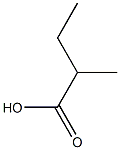Poly(acrylic acid) 50% solution , Average molecular weight m.w ~ 3,000 , 9003-01-4
Synonym(s):
2-Propenoic acid homopolymer;PAA
CAS NO.:9003-01-4
Empirical Formula: C5H10O2
Molecular Weight: 102.132
MDL number: MFCD00084394
EINECS: 618-347-7
| Pack Size | Price | Stock | Quantity |
| 100g | RMB31.20 | In Stock |
|
| 500G | RMB95.20 | In Stock |
|
| 2.5KG | RMB303.20 | In Stock |
|
| 10KG | RMB909.60 | In Stock |
|
| others | Enquire |
PRODUCT Properties
| Melting point: | 95 °C |
| Boiling point: | 116 °C |
| Density | 1.2 g/mL at 25 °C |
| Tg | 106 |
| vapor pressure | 2.64-3.57hPa at 20-25℃ |
| refractive index | n |
| Flash point: | 100 °C |
| storage temp. | 2-8°C |
| solubility | Swellable in water and glycerin and, after neutralization,
in ethanol (95%). Carbomers do not dissolve but merely
swell to a remarkable extent, since they are three-dimensionally
crosslinked microgels. |
| form | Powder |
| color | White |
| PH | 2.5 -3.0 (1% water solution) |
| Water Solubility | Soluble in water. |
| Dielectric constant | 2.7 - 4.5(0.0℃) |
| InChIKey | WLAMNBDJUVNPJU-UHFFFAOYSA-N |
| LogP | 0.23-0.27 at 20℃ and pH3.59-3.63 |
| IARC | 3 (Vol. 19, Sup 7) 1987 |
| EPA Substance Registry System | Polyacrylic acid (9003-01-4) |
Description and Uses
For a description of unrelated compounds expanded by twocarbon units,Poly acrylic acid (PAA or Carbomer) is generic name for synthetic high molecular weight polymers of acrylic acid. They may be homopolymers of acrylic acid, crosslinked with an allyl ether pentaerythritol, allyl ether of sucrose or allyl ether of propylene. In a water solution at neutral pH, PAA is an anionic polymer, i.e. many of the side chains of PAA will lose their protons and acquire a negative charge. This makes PAAs polyelectrolytes, with the ability to absorb and retain water and swell to many times their original volume. Dry PAAs are found in the market as white and fluffy powders. Carbomer codes (910, 934, 940, 941 and 934P) are an indication of molecular weight and the specific components of the polymer. For many applications PAAs are used in form of alkali metal or amonium salts e.g. sodium polyacrylate.
Polyacrylic acid is used in disposable diapers and in ion exchange resins. It is also used to study solute diffusion in polyvinyl alcohol/polyacrylic acid copolymer hydrogel. It is also employed as a thickening, suspending, emulsifying and dispersing agent in pharmaceuticals, cosmetics, adhesives and paints. Further, it is used for the preparation of poly(N-isopropylacrylamide)-block-polyacrylic acid copolymer which responds to both temperature and pH stimuli. In addition to this, it is used in preparing block copolymer of oligo (methyl methacrylate)/PAA for micellar delivery of hydrophobic drugs.
Safety
| Symbol(GHS) |  GHS08 |
| Signal word | Danger |
| Hazard statements | H340-H350 |
| Precautionary statements | P201-P202-P280-P308+P313-P405-P501 |
| Hazard Codes | C,T,Xi |
| Risk Statements | 45-46-34-36/37/38 |
| Safety Statements | 53-45-36-27-26 |
| WGK Germany | 1 |
| RTECS | AT4680000 |
| TSCA | Yes |
| HS Code | 39069090 |
| Hazardous Substances Data | 9003-01-4(Hazardous Substances Data) |
| Toxicity | LD50 oral in rat: 2500mg/kg |




